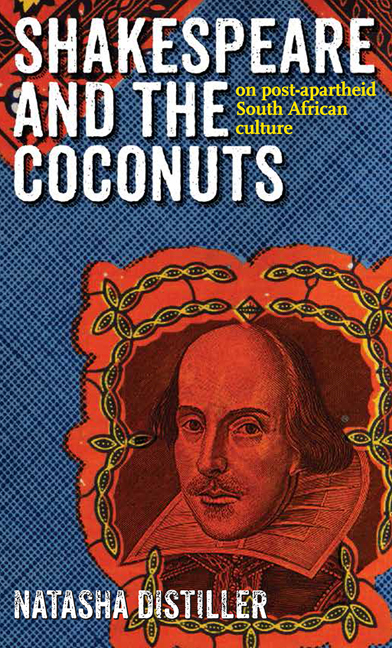Book contents
- Frontmatter
- Contents
- Acknowledgements
- Introduction
- Chapter 1 Shakespeare in English, English in South Africa
- Chapter 2 ‘Through Shakespeare's Africa’: ‘Terror and murder’?
- Chapter 3 Tony's Will: Titus Andronicus in South Africa, 1995
- Chapter 4 Begging the questions: Producing Shakespeare for post-apartheid South African schools
- Chapter 5 English and the African Renaissance
- Chapter 6 Shakespeare and the coconuts
- Endnotes
- Bibliography
- Index
Chapter 6 - Shakespeare and the coconuts
Published online by Cambridge University Press: 21 April 2018
- Frontmatter
- Contents
- Acknowledgements
- Introduction
- Chapter 1 Shakespeare in English, English in South Africa
- Chapter 2 ‘Through Shakespeare's Africa’: ‘Terror and murder’?
- Chapter 3 Tony's Will: Titus Andronicus in South Africa, 1995
- Chapter 4 Begging the questions: Producing Shakespeare for post-apartheid South African schools
- Chapter 5 English and the African Renaissance
- Chapter 6 Shakespeare and the coconuts
- Endnotes
- Bibliography
- Index
Summary
As this book has hoped to demonstrate, South Africa has a rich Shakespearean literary and political history. Important writers and thinkers have displayed, and oftentimes clearly experienced, intellectual and emotional connections to, especially, the plays. Since the days of the mission schools in colonial southern Africa, Shakespeare has been a signifier of education, civility, and erudition, as well as a vehicle for the expression of strong feelings. Encounters with the Shakespeare text have shaped hopes, allowed for public self-fashioning, and have influenced more intimate subjectivities as writers and scholars of a particular class stratification were educated in English Literature. These men (and they were mostly men) could be seen as early versions of coconuts. As such, they help us to think through the idea of the coconut and what it stands for (a proficiency in English, economic mobility, and class privilege) as an important component of South African social history. If we accept this, we also have to challenge the additional meaning of the coconut: the inauthentically black black person. Looking at Shakespeare in South African literary history is one way to look afresh at our cultural politics, particularly in the current context where racial identities are being hardened and simplified.
Perhaps as part of this movement away from complexity and towards a simplified and impoverished version of identity, something has changed in what Shakespeare enables today. If Shakespeare used to be part of a marker of class and social mobility located in the terms of a discourse of progress and modernity, knowledge of Shakespeare now comprises a much more publicly ambivalent display. Shakespeare once had a particular currency, acquired personally but activated publicly, which ‘he’ appears to be losing. This chapter describes the change in more detail.
I have been arguing that key individual examples of the role Shakespeare has played in South Africa demonstrate two things. English and Englishness can be markers and tools of Africanness. At the same time, the ‘universal’ Shakespeare anxiously seeks to justify Shakespeare in South Africa through recourse to ‘his’ apparently generally human meanings, deploying the discourse of relevance along the way. Both of these meanings are colonial products. But their effects are very different from each other.
- Type
- Chapter
- Information
- Shakespeare and the Coconutson post-apartheid South African culture, pp. 143 - 166Publisher: Wits University PressPrint publication year: 2012



